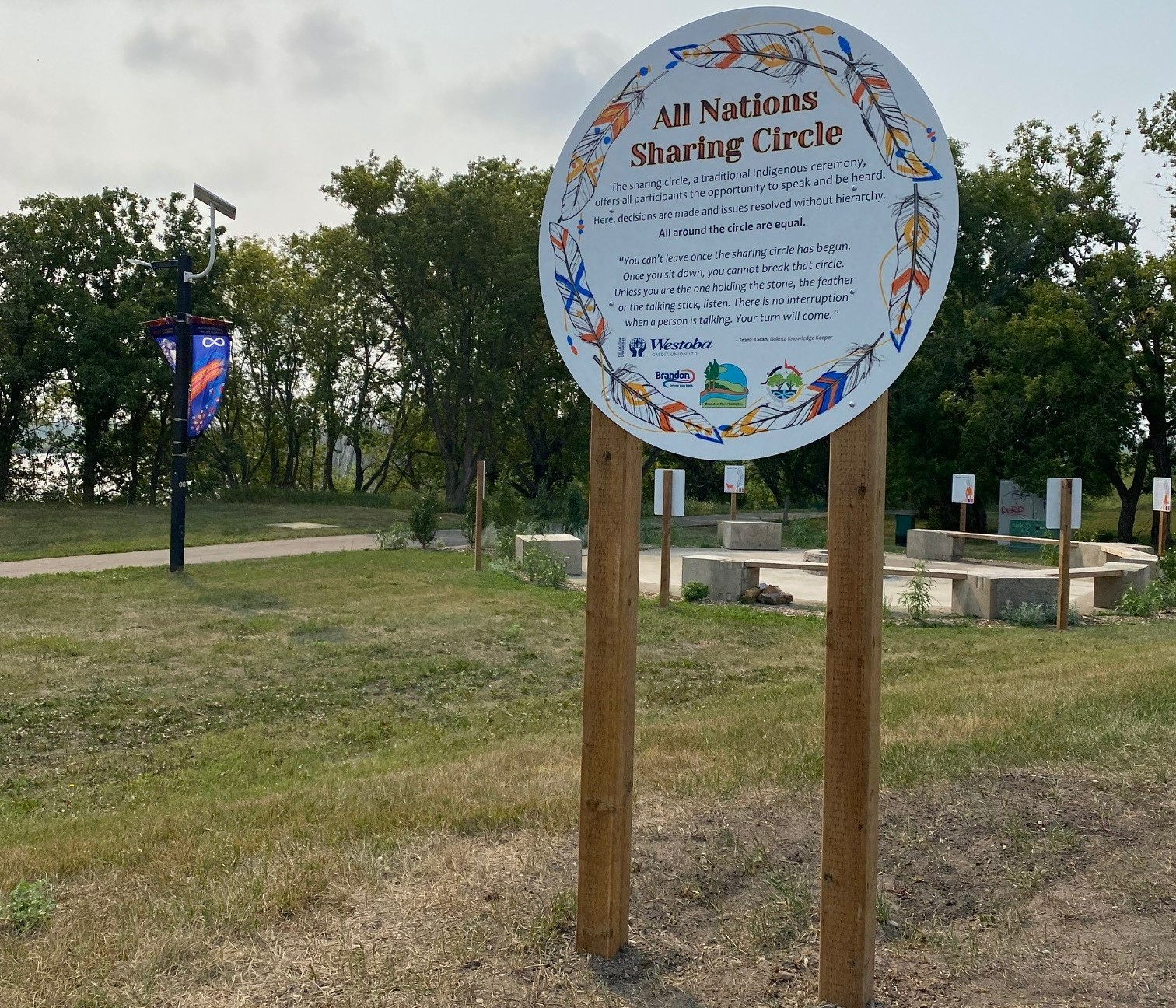All Nations Sharing Circle

All Nations Sharing Circle
Nestled on the Assiniboine River valley in which Brandon was built, Westoba Credit Union and Brandon Riverbank Inc. are pleased to host the All Nations Sharing Circle.
The sharing circle, a traditional Indigenous practice, offers participants the opportunity to speak and be heard. It is a safe place for all people (Indigenous or otherwise) to share knowledge, experiences, stories and more.
With support from Westoba Credit Union, the Sharing Circle idea became a reality in May 2021. Elder Frank Tacan, knowledge keeper for the Brandon Friendship Centre, led a blessing ceremony and requested that good for all people come from the sharing circle. On Tacan’s advice, signs reflecting the Seven Sacred Teachings; Love, Respect, Courage, Honesty, Wisdom, Humility and Truth are prominently placed around the circle.
In September 2023, volunteers from the Brandon Urban Aboriginal Peoples Council (BUAPC), the Blue Door Project, Ask Auntie and Brandon Riverbank painted a traditional medicine wheel on the floor of the All Nations Sharing Circle. Elder Tacan was once again on hand to provide a blessing for the medicine wheel and to provide a teaching. Westoba Credit Union and Brandon Riverbank shared the costs of materials.
The All Nations Sharing Circle is free to use for any persons or organizations that wish to share knowledge or make decisions in a safe and welcoming space. The space has a fire pit and picnic shelters are nearby. To reserve the space for your event please contact the Riverbank Discovery Centre at 204-729-2141.
How to use Sharing Circles
Sharing circles are an essential part of the oral tradition of Aboriginal communities. The Traditional Native Feather Wand or Talking Stick is used in these circles when meetings/ceremonies take place and when decisions have to be made.
A Talking Stick is a very special tool that gives one the courage to speak the truth and the power to speak from the heart. It is a symbol of respect for each member participating in the circle. When a person has the Talking Stick in a sharing circle, they speak from the heart without interruption – while others listen respectfully to the speaker’s message. Everyone in the circle gets a chance to hold the Talking Stick and share their thoughts and feelings. If the receiver chooses not to speak, he or she respectfully hands the Talking Stick to the next person until the item has been passed to everyone participating.
Begin the sharing circle by asking each participant to introduce themselves by sharing their names and comment on the topic at hand. The topic can be determined by the group or the leader in the circle. The leader then begins or asks a volunteer to go first. Leave room for silence, everyone can find their words in their own time. The Talking Stick should be passed in a clockwise direction or as the sun rises and sets – as is the custom in the Anishinaabe (Ojibwe) tradition.
Participants face each other in an interconnected circle. All aspects of the human being (mind, body, heart and spirit) are activated for learning and sharing. A strong sense of community is established and everyone is connected.
When Conducting a Sharing Circle…
Take responsibility for yourself – You are the only person you can change. Use “I” statements. Own your feelings, perceptions, wants, etc. Recognize that this is an opportunity for you to exercise self-care by speaking your truth, by being heard and by expressing who you really are.
Respect confidentiality – What you see, speak, share or hear is personal to another and should remain with you. The act of sharing your personal experiences should be honoured.
Adopt a beginner’s mind – Consider the possibility that there may be more for you to learn and benefit from, than what you’re currently aware of, or have experienced.
Maintain a positive focus – Focus your attention on the person sharing. Look for the gifts being shared, e.g., their openness, vulnerability, caring, etc.
Connect at the heart – Open your heart to the essence of what is being conveyed. Be willing to get “out of your mind” and release the need to evaluate, judge or compare.
Be fully engaged with the speaker – Refrain from side talks, cross talks or interrupting when someone is sharing.
When asked for feedback, give only positive support – Always share the positives! Don’t give any unsolicited advice, criticism or counselling.
When receiving acknowledgment or support, take it – Be open to receiving acknowledgment and let it sink in. Simply respond with “Thank you”.
